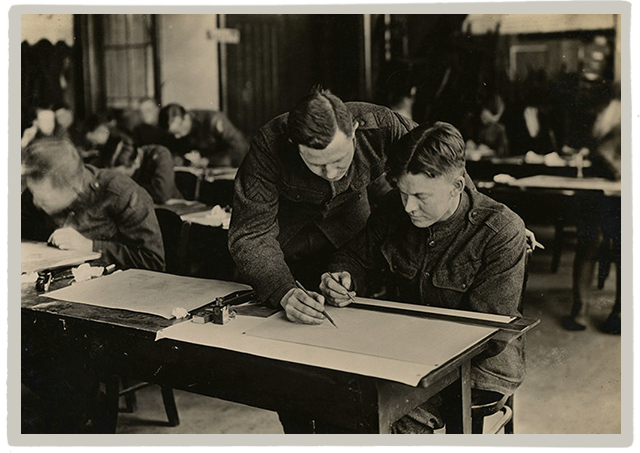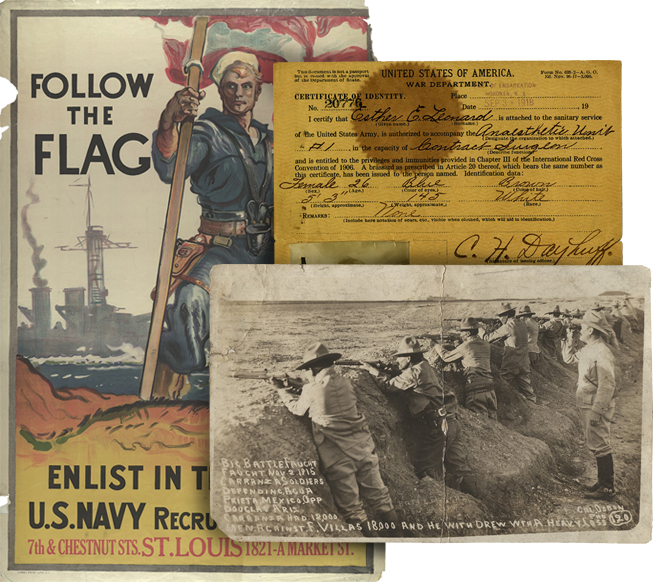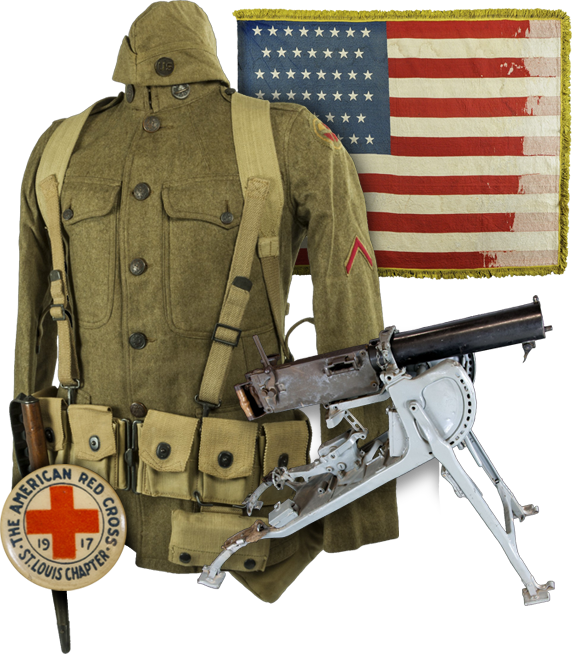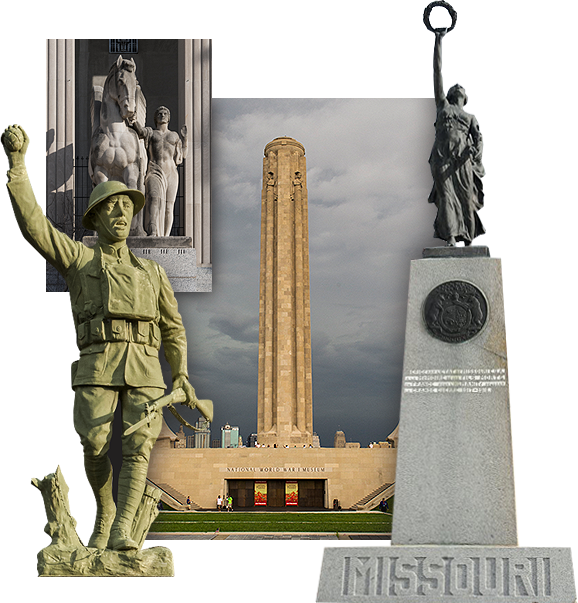James Kellogg Burnham Hockaday letter to mother - June 23, 1918

Transcript
Somewhere in England Sunday, June 23rd, 1918. My Dear Mother: There is so much to tell since I last wrote you that I don’t know where to start. I hope you got the two letters I wrote. I sent one at the port of embarkation and one from another port. It was certainly a wonderful voyage. My ship did not have the excitement of even seeing a submarine. We were seventeen days on the water and I was never so glad to see land in all my life. You may talk about the navy, but I am certainly glad I joined the army. Tell June he had better take a few weeks ride on a ship without seeing land and get a whiff of that musty odor around a ship’s dining room before he fully makes up his mind as to the navy. Taken as a whole, however, I have never enjoyed anything so much in my life. Three days before we landed, I don’t believe the sea could have been rougher. I was on guard that night and I was nearly drowned trying to inspect the submarine lookouts. The main deck was being washed over constantly. I finally went up to the bridge of the upper deck and hung on to the railing. It was a sight I shall never forget. Every now and then a bright full moon would come out from behind the clouds and throw its

Transcript
[Page 2] beams upon the white caps. Back in the distance you could see the other ships tossing on the waves. It did not seem possible that this same moon was shining down on you all way back there in Missouri. We had a comparatively smooth sea all the way over. I thought the prettiest part of the day was about a half hour before sunset when a soft glow was on the waters. You could look out and see fifteen ships throwing up a streak of foam with their bows as they glided over the smooth and rolling billows. I am now over here, somewhere in England, is all I can say. I had always hoped to come abroad sometime, but this has happened all so suddently that it is hard to believe I am on the other continent. When I wake up in the mornings, it is hard to believe it. I am certainly in love with England. I wouldn’t mind coming over here and living for a couple years. Just the little I have seen of it has certainly impressed me. The houses are all built together on streets which are very narrow, some only eight feet wide with a two foot side walk on either side; in every window are flowers or vines; it is about as quaint and picturesque a place as there could possibly be. Of course this is just one little town I am in, but from the train, I could see every little town we went through was almost on the same order.

Transcript
[Page 3] The trains are another thing. They remind me of that little steam train we used to ride around in at Electric Park. Little, low, cars divided up into eight or ten sections holding about six or eight persons. The sections are very comfortably upholstered, however, and the little engines make surprisingly fast time. One of the things which impressed me most, was the women in the big factories and plants. Every factory, whether it was an iron foundry or chemical plant or what, we passed, I did not see in it one single man. The women all would come running out in their overalls or “unionalls” and wave to us as we went by. You cannot begin to be impressed by this significance until you are over here and actually see it. It is the English women who are winning this war today, in my opinion. The sacrifices which they are undergoing has won from us all the highest admiration. I am told that the servants are working side by side with the mistresses, all in unionalls and cheerfully doing any unpleasant work assigned to them, all the way from making sheels, running steam engines, etc., to delicate tasks in a chemical factory. It does not get dark here until ten thirty P.M. It is now nearly eleven and the lights go out in a few minutes. I am going to write to Father tomorrow and tell him some more news. There is so much more to tell and I hope it all gets by the base Censor. I could not be any happier or better than I am now. There

Transcript
[Page 4] is so much new to take in that I am occupied and enjoying every minute along with my duties. Tell everyone to get their clothing over here, especially Sam Brown belts, wrap leggings, and trench coats; they are less than half price compared with in the states. Suits with much better material and cheaper are [obtainable] here as well as many other things. Woolen knit socks are very expensive here, however, so tell Aunt Jessie I owe my life to her. I have become thoroughly familiar with English money now. The banks and Y.M.C.A.’s as well as many merchants will gladly exchange U.S. currency for you. Please don’t worry about anything, Mother dear. I am having the experience of my life time. I need nothing and if I do, I can get it here. Be sure not to let any reports or rumors bother you. There will be many of them and they only cause needless worry and anxiety which does nobody any good. If you don’t hear from me for any length of time, don’t let it worry you. There may be hundreds of reasons, ships sunk, or held in harbor, etc. I can only send a cablegram in case of urgent necessity now. That is why I could not cablegram my arrival. Later on, I hear, there may be a possibility of sending you a week end cablegram. We have received no mails yet. Letters are the most welcome things just now. Tell me everything. Take turns and one of you

Transcript
[Page 5] write to me every day if possible. After the war we can all take a trip through all this wonderful and historic country. Ever so much love to you Mother dear and everyone Burnie.
Details
| Title | James Kellogg Burnham Hockaday letter to mother - June 23, 1918 |
| Creator | Hockaday, James Kellogg Burnham |
| Source | Hockaday, James Kellogg Burnham letter to mother. 23 June 1918. James Kellogg Burnham Hockaday Collection, 1917-1924. 1986.213.27. National World War I Museum, Kansas City, Missouri. |
| Description | In a letter dated June 23rd, 1918, Hockaday writes to his mother. Hockaday describes his sea voyage and his first impressions of England, including the war work of British women, and equipment prices. Hockaday served in the 354th Infantry Regiment. |
| Subject LCSH | World War, 1914-1918; United States. Army. Infantry regiment, 354th; World War, 1914-1918--Women--Great Britain; World War, 1914-1918--Equipment and supplies; World War, 1914-1918--War work--Y.M.C.A. |
| Site Accession Number | 1986.213.27 |
| Contributing Institution | National World War I Museum and Memorial |
| Copy Request | Transmission or reproduction of items on these pages beyond that allowed by fair use requires the written permission of the National World War I Museum and Memorial: (816) 888-8100. |
| Rights | The text and images contained in this collection are intended for research and educational use only. Duplication of any of these images for commercial use without express written consent is expressly prohibited. |
| Date Original | June 23, 1918 |
| Language | English |



